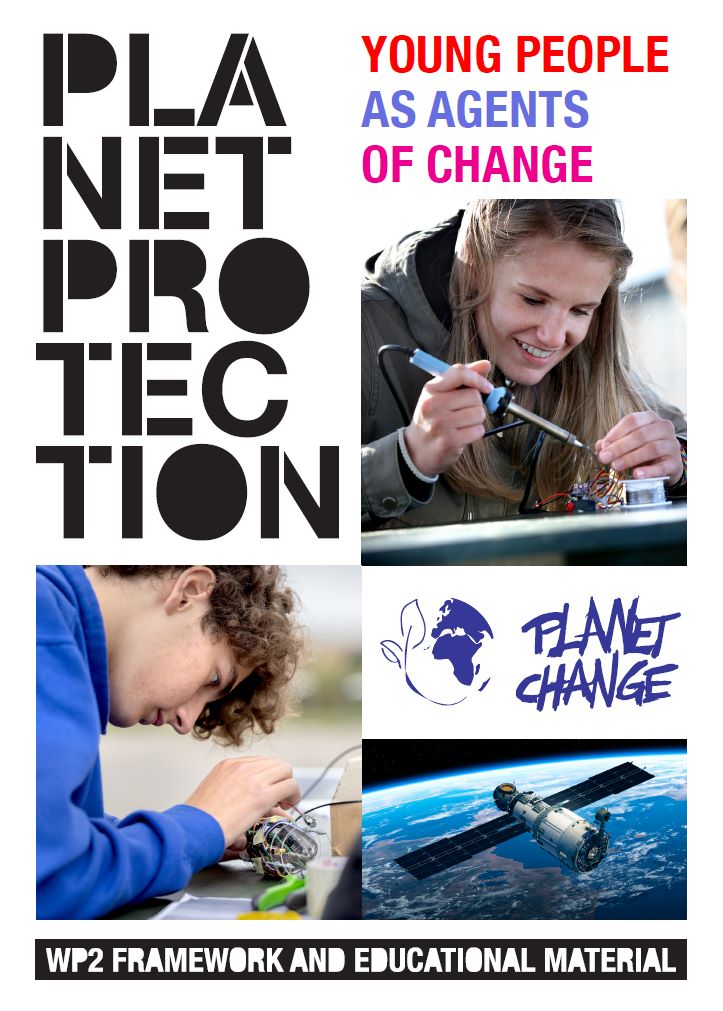
Educational Framework
The challenges developed in this programmes are based on an educational framework, which
can also be used to develop new challenges or adapt existing challenges. As part of this educational
framework, a pedagogical strategy and methodology is developed in order to make the implementation
of the challenges - specifically in the VET sector - efficient.
Courses
Planet change has developed an online training programme providing teachers with a theoretical background on the topics of
the challenges and information on inquiry based learning, gender inclusive challenges in the classroom and interdisciplinary learning.
From september 2023 until july 2025 the consortium partners of
this programme have the opportunity to provide school teams with an onsite training. Please contact the consortium partner in your country for more information. You can find the partners on the partner
page.
Challenges
The following challenges are developed for VET students aged 16y and older. First of all,
the challenges aim to make students more aware of the importance of sustainability, using
space as a context. Secondly, the challenges aim to make the students more aware of the
broad possibilities of careers in the space sector for all levels of education.
Themes
Pollution can be present in various ways; we all probably have heard about air pollution by methane or
carbon dioxide, but light pollution, for instance, can also have a big impact on our daily lives. In the
activities of this topic, we will look into both; what impact do they have, and how can they be measured
and diminished? Students will do their own research, in their local surroundings, to find out how much
pollution there is.
It is common knowledge that we use more energy every year. This means that we have to produce more
energy to keep up with popular demand, apart from creating awareness on how to save energy. For the most
efficient use of energy, technological developments are crucial. How do solar panels work, and how can
we get their efficiency up? What kind of fuels can we use to answer to the demands? The different
activities all look at (one of) these questions from different angles.
The Earth protects us from most dangers from space with its atmosphere and magnetic field, but studying
these space hazards
is essential to find ways to evade them. In this topic you can explore space weather such as solar
flares, Near Earth Objects
like comets and asteroids, and space debris in orbit around the Earth.
Construction, in the field of architecture and civil engineering, is the process of building a series of
interconnected structures based on a project within a planning process. It is not a single activity, but
a system of components, installations and finishes within which different professionals work together.
The term 'construction' is also used to refer to the work carried out in this process, a simple masonry
work (wall...), a structure (staircase...), a building (house, office…), a public work (bridge,
stadium...). The general plan of the intervention is essential for the successful realisation of a work,
as it links the architectural design to the construction and takes into account several related factors:
environmental impact and sustainability, timing of the work, site safety, availability of resources and
materials, logistics.
Agricuture is suffering more and more under the impact of the changing climate. How can we use technical
solutions to make sure we can still grow and harvest our food in the near future? How much resources and
physical room will be necessary to do so? And, what kind of agriculture is suitable for Space usage?
Through different activities, we try to show the impact and look at solutions for sustainable
agriculture. In Space, but also on our own planet.
Climate change refers to long-term shifts in temperatures and weather patterns. Such shifts can be
natural, due to changes in the sun’s activity or large volcanic eruptions. But since the 1800s, human
activities have been the main driver of climate change, such as burning fossil fuels like coal, oil and
gas, agriculture and inadequate land use. In the “Climate Change” topic, the activities designed aim to
illuminate the pressing issue of deforestation and its pervasiveness, raise awareness about the impact
of climate change on the local flora and fauna and use satellite data to monitor and understand how
global warming is decreasing the amount of sea ice, and how this may be changing important ocean
currents.
With an ever growing economy and worldwide availability and transportation of goods, the impact of that
transport is growing. How can we try to minimise that impact? Optimise transport routes (and ways),
packaging, buy more local products; there are various ways to look at the whole chain of logistics that
is involved. In these activities, we will focus on the efficiency of the transport itself, with the
students trying to make as little impact as possible with the same products.
